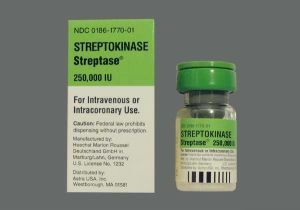 Streptokinase( Streptokinase) is a fibrinolytic agent that affects the connection of platelets and blood clotting.
Streptokinase( Streptokinase) is a fibrinolytic agent that affects the connection of platelets and blood clotting.
The drug is manufactured in the form of lyophilizate for the preparation of a solution intended for intravenous and intra-arterial administration. One bottle contains 1500000 IU of lyophilizite.
Contents
- Scope
- Scope
- When the agent is not prescribed
- Instruction for use
- Overdose and side effects
- Special conditions and patients
- Is the view
- Price question
Pharmacological profile
Streptokinase is a natural highly purified enzyme. As a result of its connection with plasminogen( blood protein), a complex is formed that facilitates the transition of plasminogen to plasmin. The latter, in turn, destroys fibrinogen and other sources of coagulation, preventing clot formation.
The drug is able to destroy clots not only on the surface, but also inside. More effectively, the drug acts when affecting the fresh blood clots( age not more than 12 hours).The medication modifies blood circulation in patients with persistent heart failure, by lowering blood pressure and overall peripheral vascular response.
The half-life of the enzyme is 15-25 minutes. The final elimination period is 83 minutes. The medication is excreted by the kidneys in small amounts. The substance is not metabolized. The drug in the liver undergoes biotransformation by hydrolysis.
The mechanism of action of streptokinase is the indirect activation of plasminogen. Each molecule of the active substance binds to a molecule of blood plasmainogen and forms a complex that has proteolytic activity.
This complex activates other plasminogen molecules, which in turn cause lysis of blood clots.
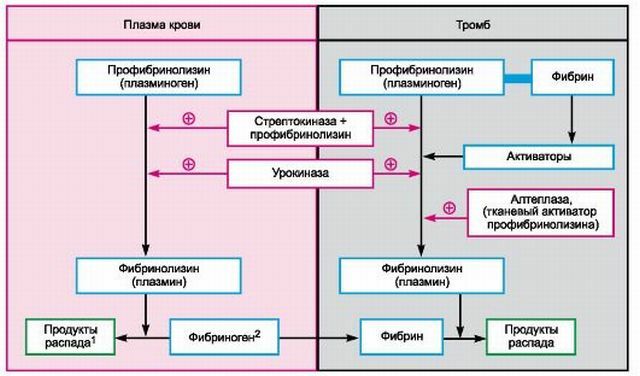
Scope of application
Indications for use Streptokinase:
- acute myocardial infarction( during the first 12 hours);
- blockage of the pulmonary artery and its branches;
- arterial thrombosis;
- thrombosis of the hemodialysis shunt;
- peripheral artery thrombosis;
- prolonged obliterating endarteritis;
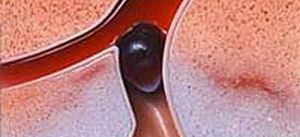
- vascular reflux;
- flattening of the arteriovenous shunt;
- thrombosis of deep and superficial veins of extremities;
- occlusion of vessels of the retina of the eye;
- thrombosis of veins of internal organs( intestines and others);
- postoperative retrombosis.
When medication is not prescribed
Drug administration is contraindicated in the following cases:
- is hypersensitive to the active ingredient of the drug;
- hemorrhagic diathesis;
- Inflammatory bowel disease;
- ulcerative-erosive lesions of the gastrointestinal tract;
- tumors with a risk of bleeding;
- presence of metastases in the central nervous system or neoplasms in the brain;
- arterial hypertension;
- advanced age( over 75 years);
- hepatic or renal insufficiency;
- is a common ulcerative colitis;
- acute pancreatitis;
- mitral heart disease accompanied by atrial fibrillation;
- diabetic retinopathy of the severe stage;
- serious lung disease( an offensive form of tuberculosis, etc.).
Instruction for use
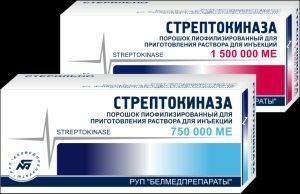 The drug is intubated intravenously, and in some cases intraarterially. The initial single dose is 250,000 IU.After the administration of this dose, the lysis of the lump begins. Over time, the drug is intubated in an amount of 100,000 IU per hour.
The drug is intubated intravenously, and in some cases intraarterially. The initial single dose is 250,000 IU.After the administration of this dose, the lysis of the lump begins. Over time, the drug is intubated in an amount of 100,000 IU per hour.
The total time of drug administration is 16-18 hours. Further therapy should be carried out with the help of Heparin and anticoagulants of indirect action.
The drug is also prescribed in case of myocardial infarction in the acute phase. Initially, 20,000 IU is introduced, followed by 3000-4000 IU, for 35-90 minutes.
In the case of extensive and arterial thrombosis, prolonged administration of streptokinase may be necessary. The best effect of the drug is with fresh thrombosis.
Overdose and side effects of
In case of an overdose of medicament, side effects increase and there is a risk of bleeding. Anti-fibrinolytic agents are prescribed to stop bleeding. At arrhythmia, antiarrhythmics are administered.
If there was a manifestation of an allergic reaction, then in this case, you should take glucocorticoids. When fever is prescribed, Paracetamol.
It is worth noting that all of the above drugs are administered after the abolition of streptokinase.
Possible side effects:
- Blood coagulation system : hemorrhage from intubation sites, skin hemorrhage, brain. There may be internal bleeding.
- Laboratory indicators .With prolonged medication, the activity of hepatic transaminases increases and cholinesterase activity decreases.
- Allergic reactions .Occur mainly with repeated injections, resulting in urticaria, skin hyperemia, dyspnoea, bronchospasm, myalgia, chills, anaphylactic shock, polyneuropathy.
- Cardiovascular system : noncardiogenic myxedema of the lungs, thromboembolism, capillarotoxicosis, embolic stroke.
- In some cases, can occur spleen rupture.
Special conditions and patients
For hepatic and renal insufficiency, the drug should be used with extreme caution. The ready-made essence of Streptokinase should be used within 12 hours. If you drink alcohol, take this medication is not recommended. 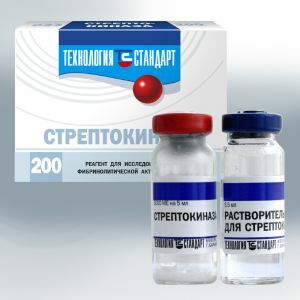
The drug is contraindicated during pregnancy( especially in the first trimester) and during lactation. Patients aged 75 and over should take the medicine with special care. Before the administration of the drug to patients with an increased titer of anti-streptokinase antitoxins, a drug susceptibility test should be performed in advance.
At the beginning of therapy, infusion is performed at a low rate. For prevention, doctors recommend administering antihistamine medications ten minutes before taking Streptokinase. It should also be remembered that re-administering the medicine may cause an allergic reaction.
With the simultaneous administration of streptokinase and other drugs that affect blood coagulation, there is a risk of bleeding. The drug is incompatible with plasma-substituting drugs( Dextran, Hydroxyethyl starch).
Is the point of view of
Opinion of doctors and patients who have experienced the action of streptokinase in practice.
The drug is effective enough if it is taken on time. From the shortcomings I can note the frequent manifestation of allergic reactions. Very often, I prescribe this remedy for myocardial infarction and retinal vascular occlusion.
Valery Ivanovich
This is a valuable drug that has a very strong therapeutic effect and a drug of choice until 2009.It is advisable to inject on a fresh thrombus. Side effects were rare.
Roman Alekseevich
My general impression of the drug was positive. They injected it intravenously to 20 000 IU for thrombosis. The thrombus was fresh, probably because it helped.
Irina
I did not feel the drug on myself, but my uncle had a heart attack and was given Streptokinase. Then there were a lot of complications in the form of an allergy, etc. But so everything seemed to work out.
Sergey
From the opinions of doctors and patients it is clear that Streptokinase is effective, especially if it is applied in time. Out of the deficiencies, there are side effects.
Price issue
The average price of a medicine is 2000-5000 rubles. The drug should be stored in a dry dark place, at a temperature of no higher than 25 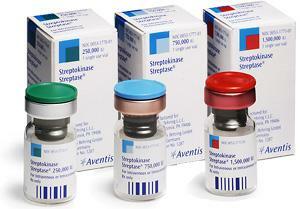 degrees. The drug is dispensed in a pharmacy under the prescription of a doctor.
degrees. The drug is dispensed in a pharmacy under the prescription of a doctor.
The following analogues of the drug Streptokinase are also available:
- Eberkinase;
- Avelysin Brown;
- Streptase;
- Cabinkinase;
- Streptodex;
- Thromboflux.
